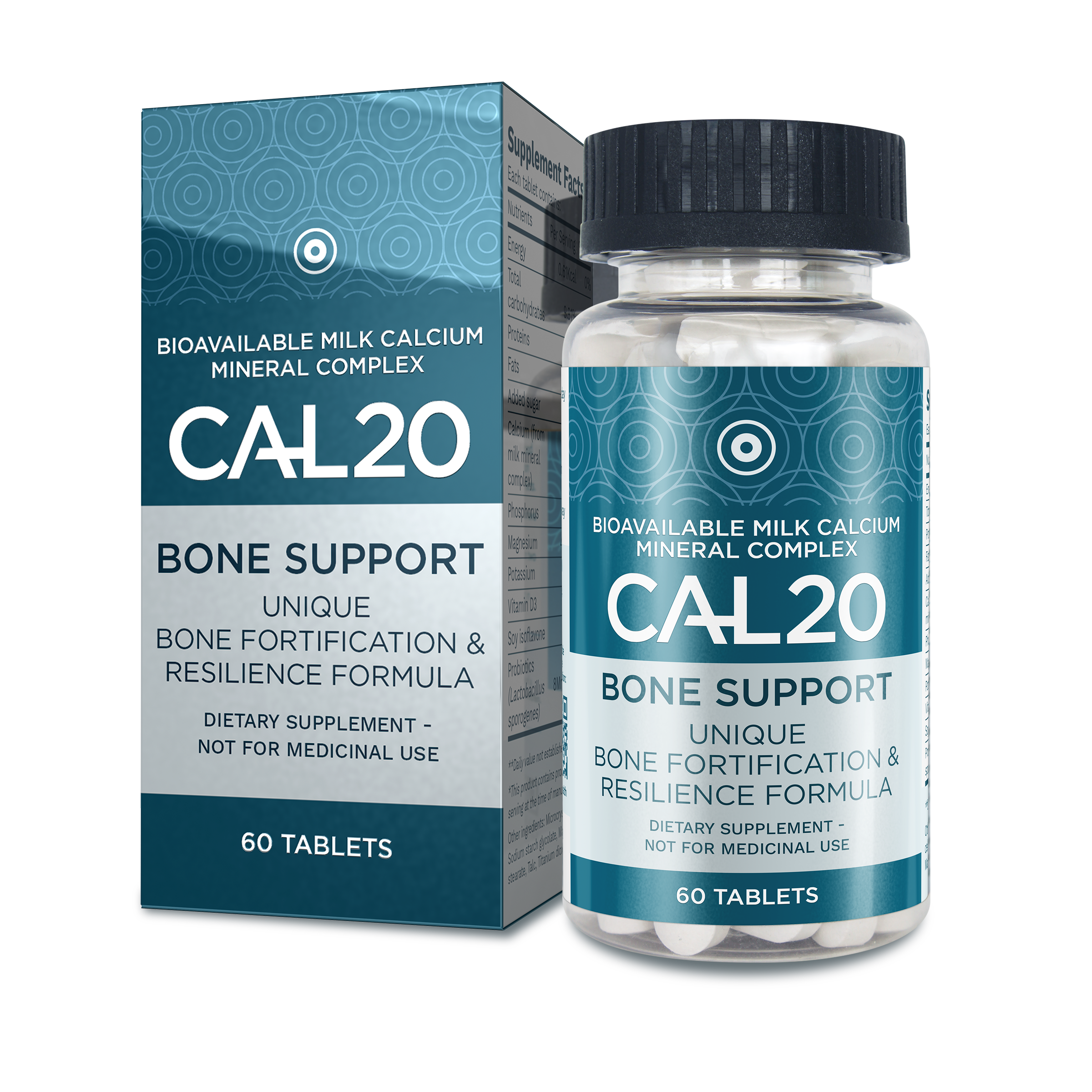Osteoporosis, a debilitating disease characterized by the weakening of bones, affects millions worldwide, predominantly impacting older adults and significantly diminishing their quality of life. This condition can impact adults of any age, making bones fragile and more susceptible to breaks even with minor falls or, in severe cases, as a result of simple daily activities. The social and health costs of osteoporosis are significant, with around 250 million people worldwide, facing not only physical discomfort but also substantial psychological and financial burdens.
Traditional calcium supplements, primarily derived from limestone (calcium carbonate) or synthesized into calcium citrate, have been the go-to solution for bolstering bone health for decades. However, their effectiveness is limited by poor bioavailability, with studies suggesting that the body can absorb as little as 2% of these forms of calcium and the side effects of too much of this typeof calcium in your body can lead to gastric irritation, constipation and kidney stones. This is where Cal20, a ground-breaking milk calcium mineral complex, is setting a new standard in osteoporosis treatment, with no known side effects.
A Leap in Bioavailability
Cal20 stands out in the crowded market of bone health supplements due to its origin and composition. Unlike conventional calcium supplements sourced from limestone—a form akin to ingesting chalk—Cal20 is derived directly from milk and has added vitamin D3 and probiotics which aid absorption. The calcium to phosphorus balance in is 2:1. The same is found in human bones. The body uses the calcium and phosphate to hold the bone structures together like cement, facilitating its integration into the bone matrix. This natural sourcing is not just a trivial difference; it fundamentally changes how the body processes and utilizes the mineral.
The bioavailability of Cal20 is nearly 100%, a stark contrast to the minimal absorption rates of calcium carbonate and calcium citrate. This high level of bioavailability means that when you consume Cal20, almost all of it is absorbed and utilized by the body, ensuring that the calcium actually contributes to bone health rather than simply passing through the system.
Rapid Bone Density Improvements
For those suffering from osteoporosis, the efficacy of a supplement is measured by its ability to enhance bone density and alleviate the symptoms of the disease. Cal20 has shown remarkable results in this regard. Customers have reported significant increases in bone density within just a few months of starting Cal20, a speed of improvement that is rarely observed with other calcium supplements or drugs. This rapid enhancement of bone strength is a beacon of hope for many who suffer from osteoporosis, offering a potential turnaround in their condition that was previously thought to be unattainable.
Reduction in Osteoporotic Pain
Alongside the improvement in bone density, Cal20 has also been associated with a notable decrease in the pain symptoms linked to osteoporosis. This reduction in pain is immensely significant for sufferers, as it directly contributes to an improved standard of living. The ability to move more freely without discomfort encourages more physical activity, which is itself beneficial for bone health and mental wellbeing, thereby creating a positive feedback loop that further enhances the effectiveness of Cal20. Moreover, Cal20 users report a reduction in the symptoms of pain associated with osteoporosis.
A New Hope in Osteoporosis Management
The introduction of Cal20 represents a pivotal shift in how osteoporosis can be managed and treated. Its superior bioavailability, coupled with its effectiveness in increasing bone density and reducing pain, makes it a compelling alternative to traditional calcium supplements. For those battling osteoporosis, Cal20 offers a new hope, not just for managing the disease, but for potentially reversing some of its effects and reclaiming a level of health and activity they may have thought was lost.
Cal20 is set apart from traditional calcium supplements by its source and bioavailability. Cal20 is not merely another calcium supplement; it is a significant advancement in the fight against osteoporosis. By harnessing the natural properties of milk-derived calcium in a highly bioavailable form, contrasting sharply with the typical 2% absorption rates of calcium carbonate and calcium citrate. This high level of bioavailability means significantly more of the ingested calcium is absorbed and used by the body, directly contributing to bone strengthening and health.
Understanding Osteoporosis
The bone is a living tissue that constantly undergoes a process of renewal—old bone is broken down and replaced by new bone. Osteoporosis occurs when the creation of new bone doesn’t keep up with the loss of old bone. Risk factors for osteoporosis include aging, hormonal changes (particularly in postmenopausal women), insufficient calcium and vitamin D intake, a sedentary lifestyle, tobacco use, excessive alcohol consumption, and certain genetic predispositions.
Symptoms of osteoporosis may not be apparent until a bone fracture occurs, but these fractures can lead to chronic pain, reduced mobility, and increased dependency. The spine, hips, and wrists are the most common areas affected by fractures due to osteoporosis.
Current Treatments for Osteoporosis
The conventional management of osteoporosis has primarily focused on slowing or stopping bone density loss, increasing bone strength, and preventing bone fractures. Common treatments include:
Calcium and Vitamin D: Essential for bone health, these supplements are often recommended to ensure adequate nutrient intake. Cal20 contains vitamin D3.
Getting calcium from food is an essential component of maintaining strong bones and overall health. Dairy products like milk, cheese, and yogurt are rich sources of calcium and are readily absorbed by the body. For those who prefer non-dairy options, leafy green vegetables such as kale, broccoli, and bok choy, as well as fortified foods like orange juice, plant milks, and cereals, offer good alternatives. Beans and lentils, almonds, and tofu set in calcium sulfate are also excellent sources of this vital mineral. Incorporating a variety of these foods into your daily diet can help ensure adequate calcium intake, which is crucial for bone health and preventing conditions like osteoporosis.
Vegans can obtain calcium from a variety of plant-based sources to ensure they meet their daily needs without consuming animal products. Fortified plant milks (such as almond, soy, or oat milk) and fortified juices provide significant amounts of calcium. Leafy green vegetables, particularly kale, collard greens, and bok choy, are excellent sources. Other vegan-friendly options include tofu made with calcium sulfate, calcium-fortified tofu, various nuts and seeds (like almonds and chia seeds), and legumes, particularly chickpeas and kidney beans. Additionally, some types of seaweed and dried figs are good sources of calcium. Eating a diverse range of these foods can help vegans maintain healthy calcium levels, which is essential for bone health and overall well-being.
Bisphosphonates: These are medications commonly prescribed to prevent the loss of bone density.
They include drugs such as Fosamax, Prolia, alendronate, risedronate, and ibandronate. They have some negative side effects and typically should not be used for more than 3-5 years due to these side effects. (NOTE: See references for more information on Bisphosphonate drugs)
Lifestyle Changes:
Increasing physical activity, particularly weight-bearing and muscle-strengthening exercises, can help build and maintain bone density. Additionally, quitting smoking and reducing alcohol intake are crucial preventive measures.
Despite these changes in diet and exercise, many patients continue to experience significant challenges due to low adherence rates, side effects, and the incomplete efficacy of traditional supplements, which leads to an urgent need for more effective solutions.
Clinical Impact of Cal20
The effectiveness of Cal20 in managing osteoporosis is not just theoretical but has been observed in tangible improvements in patients’ bone density. This evidence can be found on the Younger For Life website. Studies and customer testimonials indicate that individuals taking Cal20 have experienced noticeable increases in bone density within months of starting the supplement. This rapid improvement is a significant advantage over other treatments, which may take longer to show effects or may never fully counteract the bone density loss.
Cal20 represents a revolutionary step forward in the treatment of osteoporosis. Its unique milk-derived formulation and unmatched bioavailability set it apart from traditional calcium sources, offering a more effective and quicker path to improving bone health. Cal20 is setting new standards for effectiveness in bone health supplements, providing tangible benefits for those in need. As more people turn to Cal20, the landscape of osteoporosis treatment is poised to change, bringing new hope to those affected by this debilitating condition.
References
Long-Term Bisphosphonate Use: When To Stop? When To Restart? By Diane L. Schneider, MD, MSc Today’s Geriatric Medicine Vol. 8 No. 2 P. 10
Adverse Reactions and Drug–Drug Interactions in the Management of Women with Postmenopausal Osteoporosis ; René Rizzoli,1 Jean-Yves Reginster,2 Steven Boonen,3 Gérard Bréart,4 Adolfo Diez-Perez,5 Dieter Felsenberg,6 Jean-Marc Kaufman,7 John A. Kanis
Harvard Health: How long should you take a bisphosphonate for osteoporosis?
March 8, 2016
Heart failure in patients treated with bisphosphonates
E. L. Grove1 , B. Abrahamsen2,3 & P. Vestergaard4 From the 1 Department of Cardiology, Aarhus University Hospital, Aarhus; 2 Department of Medicine F, Gentofte Hospital, Hellerup; 3 OPEN, Institute of Clinical Research, University of Southern Denmark, Odense; and 4 Medical Faculty, Aalborg University, Aalborg, Denmark




